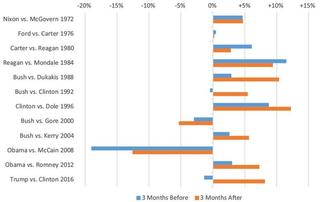- Sections :
- Crime & Public Safety
- Restaurants & Food
- Sports
- More
Categories
HFG Wealth Management Provides Update on Coronavirus in Regards to Financial Outlook

THE WOODLANDS, TX - We want to provide an update to our note on Coronavirus Monday given the historic market reaction this week, the intense media coverage and most importantly, how it is affecting investor psychology.
Equity markets have had an extremely quick and negative reaction this week. Yesterday, in a weak tape, the Dow dropped more than 500 points in the last half hour, largely spurred on by algorithmic momentum trading programs as buyers stepped away. This has been one of the fastest corrections in financial history. On Wednesday, the equity markets opened strongly as investors felt the previous two day 1,900 point drop in the Dow had been overdone. However, after a headline from a local New York radio station hit the newswires, announcing that as many as 40 people in neighboring Long Island were suspected to have been infected, the market immediately started moving lower. The fact that it was later revealed that none had yet been shown to have the virus did not seem to matter, as the damage had already been done. Similarly, the reports of a single confirmed case in Brazil triggered a market selloff that erased six months of gains in the Brazilian stock market, which had outperformed the rest of the region up to that point.
This type of market behavior is typical of crowd mentality, where fear of the unknown overrides rational thought. Behavioral psychologists would characterize this as xenophobia – the fear of anything beyond ones comfort zone. The overriding fear in this risk-off market is that the spread of the virus will become a global pandemic and crush the global economy, triggering a recessionary environment. While it is certainly prudent to assign some level of risk to future events, we can only deal with the facts at hand and evaluate that in our risk-reward analysis. Given the tremendous amount of news coverage on the virus, it is very easy to extrapolate disaster scenarios.
While this is a human tragedy, our focus to determine whether or not this will be an investment one. Death and suffering is not be minimized from a human perspective, but investment analysis requires a cold look at data at hand in order to understand a situation.
- As a starting point, the data from China is relatively positive. The overall viral rate
of growth has declined, and even though there are new cases, the pace seems to be slowing. Daily recoveries from the illness have exceeded new infections throughout the past week, so the number of active cases globally has now actually fallen for eight consecutive days.
- Confirmation of this data is that the local Chinese markets have rallied 10% over the last three weeks, even as global markets have declined. Market fears are so focused on the potential spread of the disease into other markets that stocks in both the U.S. and the rest of the world have now performed worse than China for the year to date.
- We believe the most important metric to focus on is not the total number of cases but the active ones. There are currently 80,088 confirmed cases and 2,699 deaths from the coronavirus COVID-19 outbreak as of Monday. However, there have been 30,597 cases with an outcome (2,699 deaths and 27,898 recovered.) The total active cases now stand at 49,923, which is a drop of 15% from the peak on February 17th. The pace of virus growth looks to be slowing.
- The worry for markets is that COVID-19 has now broken out on a number of new regional fronts and is potentially building enough momentum to become a global pandemic. Even with the new cases that are being seen in South Korea, Italy and Iran (where data is suspect) and Brazil, the mortality rate is less than 1%, which is a lower percentage than the China numbers. Given that the number of cases outside of China and cruise ships is relatively small – just over 2,200 globally, such fears might seem excessive.
- While not to minimize the severity of the virus, it helps to put these numbers in perspective. About 78,000 people in China are sick, in a population that numbers over 1 billion - that is less than 1/1000 of 1%. According to the Centers for Disease Control and Prevention (CDC), influenza (commonly called the flu) has already caused an estimated 29 - 41 million illnesses, 280,000 – 500,000 hospitalizations and as many as 41,000 deaths from October 1, 2019 through February 15th just in the United States.
With all that being said, the question remains why markets have reacted so violently. One “culprit” that has been targeted is the news media. Why are the news organizations not talking about what the mortality rate looks like or about the fact that China seems to be improving? The simple fact is that “news” today has become less about actual fact and more about what grabs ratings or “likes” on Facebook and Twitter. A recent news program suggested that COVID19 could be similar to the 1918 Spanish Flu, which killed hundreds of thousands in the U.S. Obviously, nobody can predict what could happen, but the state of medical information and technology in 2020 is far superior to what was available in 1918, and given our current healthcare system and response readiness, the statement seems a bit over the top.
It is also worth noting that market reactions to virus related events are nothing new. Even if equities tend to initially react strongly to the onset of the news cycle, the effects are not long-lasting. It has also been well documented that 10% peak to trough declines tend to occur about once a year, and last for an average of about 114 days. The last such occurrence was in December, 2018 so apparently we are right on schedule.
From a macro-economic point of view, the real question is how this will impact the US economy. The US is relatively insulated, and has solid economic underpinnings with an accommodative central bank. The US consumer will continue to be one of the key drivers to US economic growth. These factors are significantly more important than the short-term effects of the virus.
We believe, based upon our analysis of the currently available data, and ignoring the emotional response to the market decline, that the Coronavirus will be just like all the other viral events that we have seen over the past decades and that the market decline will be relatively short-lived. As we have discussed in our previous notes, we have defensively allocated the tactical portion of our portfolio in short-term Treasuries, but we remain ready to take advantage of the decline and increase or exposure to equities once the current volatility subsides.
Equity markets have had an extremely quick and negative reaction this week. Yesterday, in a weak tape, the Dow dropped more than 500 points in the last half hour, largely spurred on by algorithmic momentum trading programs as buyers stepped away. This has been one of the fastest corrections in financial history. On Wednesday, the equity markets opened strongly as investors felt the previous two day 1,900 point drop in the Dow had been overdone. However, after a headline from a local New York radio station hit the newswires, announcing that as many as 40 people in neighboring Long Island were suspected to have been infected, the market immediately started moving lower. The fact that it was later revealed that none had yet been shown to have the virus did not seem to matter, as the damage had already been done. Similarly, the reports of a single confirmed case in Brazil triggered a market selloff that erased six months of gains in the Brazilian stock market, which had outperformed the rest of the region up to that point.
This type of market behavior is typical of crowd mentality, where fear of the unknown overrides rational thought. Behavioral psychologists would characterize this as xenophobia – the fear of anything beyond ones comfort zone. The overriding fear in this risk-off market is that the spread of the virus will become a global pandemic and crush the global economy, triggering a recessionary environment. While it is certainly prudent to assign some level of risk to future events, we can only deal with the facts at hand and evaluate that in our risk-reward analysis. Given the tremendous amount of news coverage on the virus, it is very easy to extrapolate disaster scenarios.
While this is a human tragedy, our focus to determine whether or not this will be an investment one. Death and suffering is not be minimized from a human perspective, but investment analysis requires a cold look at data at hand in order to understand a situation.
- As a starting point, the data from China is relatively positive. The overall viral rate
of growth has declined, and even though there are new cases, the pace seems to be slowing. Daily recoveries from the illness have exceeded new infections throughout the past week, so the number of active cases globally has now actually fallen for eight consecutive days.
- Confirmation of this data is that the local Chinese markets have rallied 10% over the last three weeks, even as global markets have declined. Market fears are so focused on the potential spread of the disease into other markets that stocks in both the U.S. and the rest of the world have now performed worse than China for the year to date.
- We believe the most important metric to focus on is not the total number of cases but the active ones. There are currently 80,088 confirmed cases and 2,699 deaths from the coronavirus COVID-19 outbreak as of Monday. However, there have been 30,597 cases with an outcome (2,699 deaths and 27,898 recovered.) The total active cases now stand at 49,923, which is a drop of 15% from the peak on February 17th. The pace of virus growth looks to be slowing.
- The worry for markets is that COVID-19 has now broken out on a number of new regional fronts and is potentially building enough momentum to become a global pandemic. Even with the new cases that are being seen in South Korea, Italy and Iran (where data is suspect) and Brazil, the mortality rate is less than 1%, which is a lower percentage than the China numbers. Given that the number of cases outside of China and cruise ships is relatively small – just over 2,200 globally, such fears might seem excessive.
- While not to minimize the severity of the virus, it helps to put these numbers in perspective. About 78,000 people in China are sick, in a population that numbers over 1 billion - that is less than 1/1000 of 1%. According to the Centers for Disease Control and Prevention (CDC), influenza (commonly called the flu) has already caused an estimated 29 - 41 million illnesses, 280,000 – 500,000 hospitalizations and as many as 41,000 deaths from October 1, 2019 through February 15th just in the United States.
With all that being said, the question remains why markets have reacted so violently. One “culprit” that has been targeted is the news media. Why are the news organizations not talking about what the mortality rate looks like or about the fact that China seems to be improving? The simple fact is that “news” today has become less about actual fact and more about what grabs ratings or “likes” on Facebook and Twitter. A recent news program suggested that COVID19 could be similar to the 1918 Spanish Flu, which killed hundreds of thousands in the U.S. Obviously, nobody can predict what could happen, but the state of medical information and technology in 2020 is far superior to what was available in 1918, and given our current healthcare system and response readiness, the statement seems a bit over the top.
It is also worth noting that market reactions to virus related events are nothing new. Even if equities tend to initially react strongly to the onset of the news cycle, the effects are not long-lasting. It has also been well documented that 10% peak to trough declines tend to occur about once a year, and last for an average of about 114 days. The last such occurrence was in December, 2018 so apparently we are right on schedule.
From a macro-economic point of view, the real question is how this will impact the US economy. The US is relatively insulated, and has solid economic underpinnings with an accommodative central bank. The US consumer will continue to be one of the key drivers to US economic growth. These factors are significantly more important than the short-term effects of the virus.
We believe, based upon our analysis of the currently available data, and ignoring the emotional response to the market decline, that the Coronavirus will be just like all the other viral events that we have seen over the past decades and that the market decline will be relatively short-lived. As we have discussed in our previous notes, we have defensively allocated the tactical portion of our portfolio in short-term Treasuries, but we remain ready to take advantage of the decline and increase or exposure to equities once the current volatility subsides.
Comments •

















